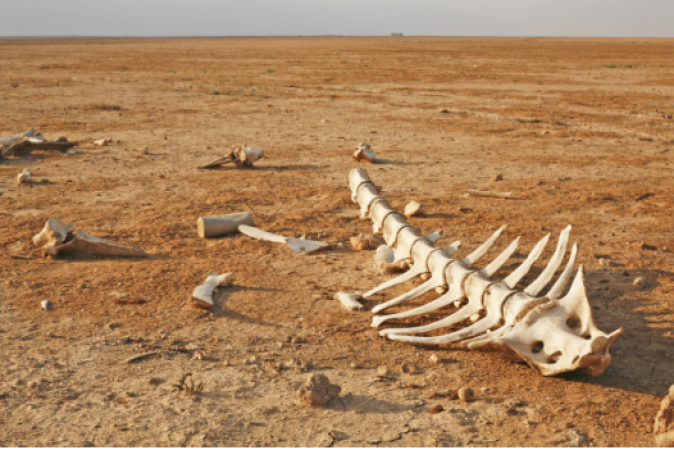
UN: According to a group of leading scientists, experts are ignoring the worst case scenarios for the effects of climate change, such as the possible extinction of humans or the collapse of society. In order to "bring into focus how much is at stake in a worst-case scenario," eleven scientists from around the world are requesting that the Intergovernmental Panel on Climate Change, the world's leading organisation for climate science, produce a special science report on "catastrophic climate change."
The idea of human extinction and global societal collapse is brought up in the third sentence of their perspective article in Monday's Proceedings of the National Academy of Sciences, calling it "a dangerously underexplored topic."
The scientists stated that they are not predicting the worst. The issue, according to them, is that no one knows whether a "climate endgame" is likely or unlikely, and the world needs those calculations to fight global warming.
Humans are incredibly resilient, according to study author Luke Kemp of the Center for the Study of Existential Risk at the University of Cambridge in England. "I think it's highly unlikely you are going to see anything close to even extinction over the next century," he said. "Even if there is a 1% chance that we will experience a global catastrophe or go extinct over the next century, that 1% is way too high."
Climate catastrophe scenarios "appear likely enough to warrant attention" and can result in protection and warning mechanisms, according to Kemp.
According to study authors, sound risk analyses take into account both the most likely scenario and the worst-case scenario.
According to co-author Tim Lenton, director of the Global Systems Institute at the University of Exeter in England, mainstream climate science has focused disproportionately on low-temperature warming scenarios that are close to international goals because of resistance from non-scientists who deny climate change.
Lenton claimed that there is "insufficient emphasis on how things, the risks, the big risks, could plausibly go very wrong."
Lenton said it is comparable to an aeroplane. It's extremely likely that it will land without incident, but only because so much effort was put into planning for the worst-case scenario and then determining how to prevent a collision. According to him, it only functions if you research what could go disastrously wrong, which isn't being done enough with regard to climate change.
Jonathan Overpeck, dean of the University of Michigan's environmental school, who was not involved in the study, stated that "the stakes may be higher than we thought." He expresses concern that unknowledgeable climate risks could be discovered by the world.
When international scientific organisations examine climate change, they frequently focus solely on global phenomena like extreme weather, rising temperatures, ice sheets melting, sea levels rising, and extinctions of plants and animals.
But according to study authors, they don't take enough into account how these have an impact on human societies and interact with current issues like hunger, war, and disease.
Kristie Ebi, a co-author and professor of public health and climate change at the University of Washington, said, "If we don't look at the intersecting risks, we'll be painfully surprised." Like Lenton, Ebi has participated in United Nations global climate assessments.
When evaluating potential pandemics prior to Covid-19, health professionals made this error, according to Ebi. They discussed the spread of disease but not lockdowns, issues with the supply chain, or soaring economies.
More than the physical changes to Earth itself, study authors said they are concerned about societal collapse caused by climate change, including war, famine, and economic crises.
Even though many people reject climate doom talk, outside climate scientists and risk experts were both welcoming and cautious of focusing on the worst of the worst.
According to climate scientist Andrew Weaver of the University of Victoria and former Green Party lawmaker for British Columbia, "I do not believe civilisation as we know it will make it out of this century." Humans who are resilient will survive, but our urbanised societies that depend on rural agriculture won't.
Climate scientist Zeke Hausfather of the tech firm Stripe and Berkeley Earth has previously criticised climate scientists for using future carbon pollution scenarios when the world is no longer on those paths to more rapid warming. Yet, he added, "as long as we are careful not to conflate the worst case with the most likely outcome, it does make sense to look at catastrophic scenarios."
Human extinction is not "a very effective communications device," according to Kim Cobb, a climate scientist at Brown University. People frequently respond by saying, "Well, that's just arm waving or doomsday prophecy,"
She claimed that the current situation is already terrible enough.
Researching worst-case scenarios, co-author Tim Lenton said, revealed nothing to be concerned about: "Perhaps it's that you can completely rule out a number of these bad scenarios. That's actually really worthwhile for you to spend your time doing. So let's all try to smile a little.
Heavy rain in Kerala; 10 death, more rain likely
IMD forecasts rain in Tamil Nadu till Thursday
Biden will declare national climate emergency: John Kerry
Canada supports flood, landslide recovery efforts in Columbia